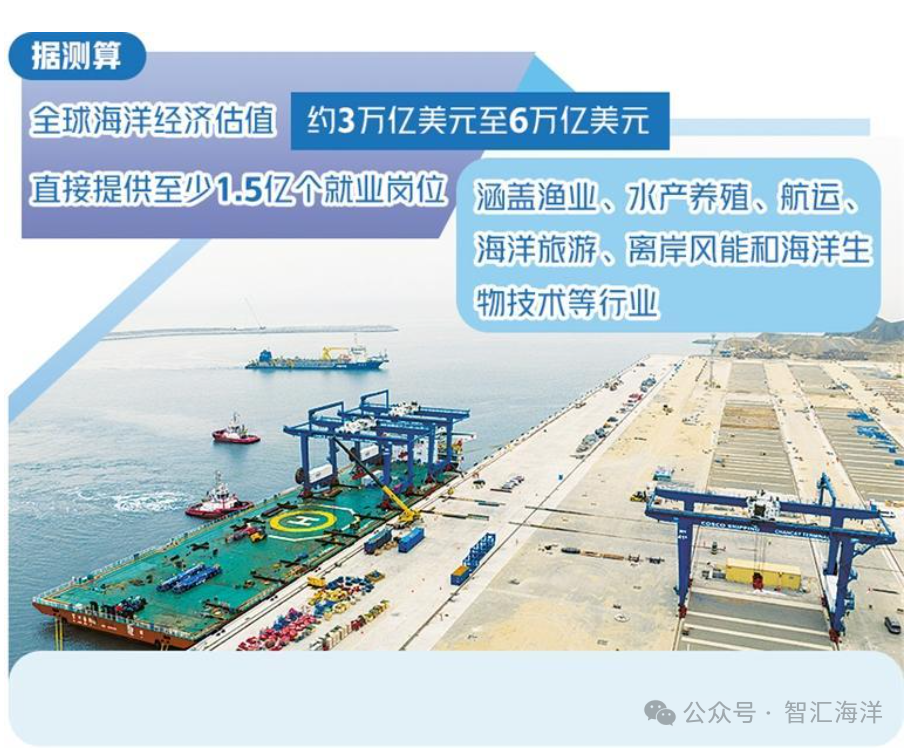




The 5th United Nations Ocean Forum was recently held in Geneva, exploring the intersection of ocean economies, trade policy, climate change, and sustainable development. The forum called for international cooperation to advance the sustainable development of the global ocean economy.
Sustainable ocean economy is a critical factor for humanity’s well-being. The forum highlighted that Sustainable Development Goal 14 (SDG 14) of the United Nations emphasizes the protection and sustainable use of ocean resources. However, the international community still lacks a unified definition of a sustainable ocean economy. According to UNCTAD, the sustainable ocean economy refers to “all industries that ensure the sustainable utilization and conservation of marine and coastal resources while securing long-term human benefits.” The global ocean economy is valued between $3 trillion and $6 trillion, directly providing at least 150 million jobs across industries such as fishing, aquaculture, shipping, marine tourism, offshore wind energy, and marine biotechnology. If these industries develop sustainably according to UNCTAD’s definition, they will be key components of global economic sustainability and directly impact human well-being.
In terms of promoting economic growth, the ocean trade market is vast, with South-South trade on the rise. In 2023, the total global trade in ocean-related goods and services reached $2.2 trillion, with marine goods exports totaling $900 billion and marine services exports reaching $1.3 trillion. Developing countries are playing an increasingly significant role in ocean trade, with South-South trade accounting for 41% of global exports in marine fisheries and aquaculture products in 2023. Regarding enhancing environmental sustainability, industries such as international shipping and marine tourism are implementing measures to reduce carbon emissions through new energy-powered vessels and port carbon reduction programs. It is projected that by 2050, global maritime carbon emissions could achieve net zero. The ocean industry is gradually transitioning toward sustainability, including the promotion of biodegradable fishing nets and seaweed-based plastic alternatives, which help reduce plastic pollution and minimize damage to marine ecosystems. Stricter fishery resource management policies are also being increasingly adopted worldwide. By reducing overfishing and illegal fishing, these policies ensure the long-term stability of fishery resources. In terms of achieving social equity and development, trade serves as a key driver of economic growth for small island developing states (SIDS). Additionally, 90% of global fisheries employment comes from small-scale fishers. The development of sustainable ocean trade can improve their livelihoods and promote fair income distribution. Furthermore, trade facilitates technological cooperation and capacity-building in developing countries, particularly in areas such as marine renewable energy and smart fishery management, contributing to a more equitable global ocean trade system.
The forum emphasized that the development of the ocean economy is deeply intertwined with climate issues. On the one hand, the growth of the ocean economy poses significant threats to marine ecosystems. According to statistics, the ocean economy accounts for at least 11% of global greenhouse gas emissions. On the other hand, the ocean economy is highly vulnerable to global climate change. Rising sea levels lead to coastal erosion and damage to infrastructure. Extreme weather events impact the livelihoods of coastal communities and increase economic losses. Changes in fishery resources present unprecedented challenges to the global fishing industry.
The green development of the ocean economy can significantly contribute to mitigating climate change. In terms of energy supply, the ocean is rich in renewable energy resources. Offshore wind energy has huge development potential, which can help reduce reliance on fossil fuels and lower carbon emissions. Additionally, tidal and wave energy can provide a stable supply of renewable energy. Furthermore, marine ecosystems such as mangroves, seagrass beds, and salt marshes play a vital role in carbon absorption and storage, helping to alleviate the impact of climate change. Regarding emission reduction, the development of green shipping, optimization of shipping routes, and port decarbonization can facilitate a low-carbon transition in the maritime and logistics sectors. Reducing carbon emissions in fisheries, promoting sustainable aquaculture, and enhancing marine biological carbon sequestration can support sustainable fisheries development while reducing emissions.
In terms of environmental restoration, efforts to expand marine protected areas, curb overfishing and ecological degradation, reduce plastic pollution, and promote marine waste cleanup and recycling can enhance the resilience of marine ecosystems. Strengthening coastal communities’ adaptation to climate change will further support the protection and restoration of marine ecosystems.
The ocean is a shared resource for all humankind, and this forum emphasized the critical role of international cooperation in advancing sustainable ocean development.
The first is enhancing Global Ocean Governance and Policy Coordination. The international community must strengthen legal and policy frameworks to ensure global cooperation and coordination in tackling marine pollution, fisheries resource management, and climate change adaptation.
The second is Supporting a Sustainable Ocean Economy Through International Financial Cooperation. The sustainable development of the ocean economy requires strong financial support. A combination of financial tools, including official development assistance (ODA), philanthropic financing, blended finance, and debt-for-nature swaps, can be used to support sustainable ocean projects in developing countries and promote low-carbon ocean industries.
The third is Promoting South-South Cooperation in Fisheries and Aquaculture Trade. South-South cooperation holds great potential in the ocean economy, but developing countries still face significant trade barriers. Strengthening South-South collaboration can reduce trade barriers, improve market access for sustainable marine products, facilitate global fisheries trade, simplify import-export procedures, and enhance supply chain efficiency. Additionally, technical cooperation can help developing countries enhance aquaculture capacity and improve food safety standards.
The fourth is Strengthening Climate Change Adaptation Through Collaboration. Climate change is posing increasing risks to the ocean economy, and global efforts are needed to address challenges such as rising sea levels that threaten infrastructure in small island developing states (SIDS), extreme weather events that increase economic losses in coastal regions and disrupt port operations and maritime trade, and global warming which causes fish migration, and affects the distribution of fishery resources.
Source: Economic Daily